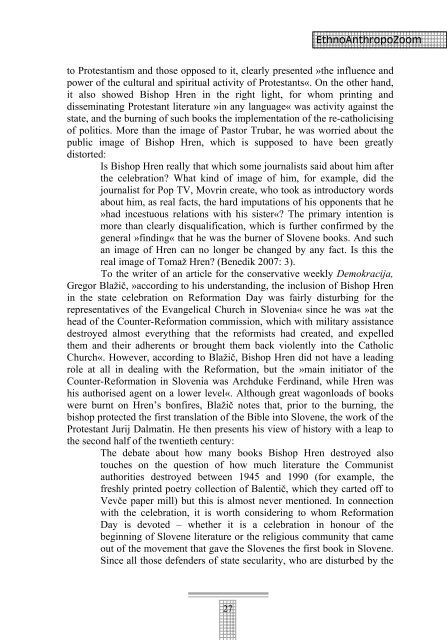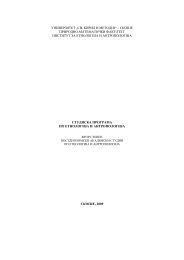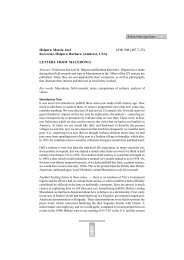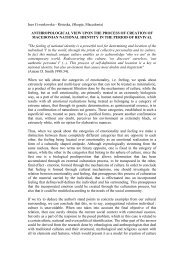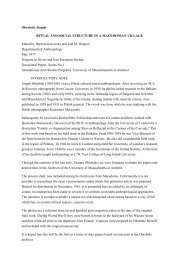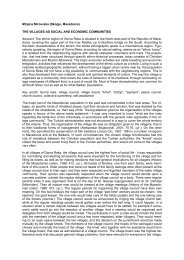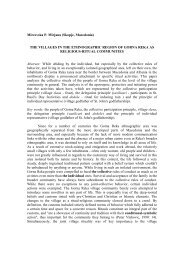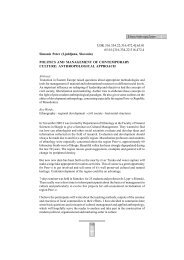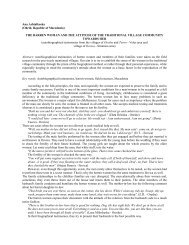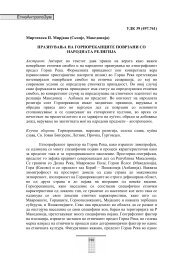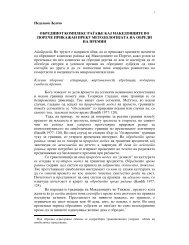Jezernik, Bozidar (Slovenia), The Red and the Black
Jezernik, Bozidar (Slovenia), The Red and the Black
Jezernik, Bozidar (Slovenia), The Red and the Black
You also want an ePaper? Increase the reach of your titles
YUMPU automatically turns print PDFs into web optimized ePapers that Google loves.
EthnoAnthropoZoom<br />
to Protestantism <strong>and</strong> those opposed to it, clearly presented »<strong>the</strong> influence <strong>and</strong><br />
power of <strong>the</strong> cultural <strong>and</strong> spiritual activity of Protestants«. On <strong>the</strong> o<strong>the</strong>r h<strong>and</strong>,<br />
it also showed Bishop Hren in <strong>the</strong> right light, for whom printing <strong>and</strong><br />
disseminating Protestant literature »in any language« was activity against <strong>the</strong><br />
state, <strong>and</strong> <strong>the</strong> burning of such books <strong>the</strong> implementation of <strong>the</strong> re-catholicising<br />
of politics. More than <strong>the</strong> image of Pastor Trubar, he was worried about <strong>the</strong><br />
public image of Bishop Hren, which is supposed to have been greatly<br />
distorted:<br />
Is Bishop Hren really that which some journalists said about him after<br />
<strong>the</strong> celebration? What kind of image of him, for example, did <strong>the</strong><br />
journalist for Pop TV, Movrin create, who took as introductory words<br />
about him, as real facts, <strong>the</strong> hard imputations of his opponents that he<br />
»had incestuous relations with his sister«? <strong>The</strong> primary intention is<br />
more than clearly disqualification, which is fur<strong>the</strong>r confirmed by <strong>the</strong><br />
general »finding« that he was <strong>the</strong> burner of Slovene books. And such<br />
an image of Hren can no longer be changed by any fact. Is this <strong>the</strong><br />
real image of Tomaž Hren? (Benedik 2007: 3).<br />
To <strong>the</strong> writer of an article for <strong>the</strong> conservative weekly Demokracija,<br />
Gregor Blažič, »according to his underst<strong>and</strong>ing, <strong>the</strong> inclusion of Bishop Hren<br />
in <strong>the</strong> state celebration on Reformation Day was fairly disturbing for <strong>the</strong><br />
representatives of <strong>the</strong> Evangelical Church in <strong>Slovenia</strong>« since he was »at <strong>the</strong><br />
head of <strong>the</strong> Counter-Reformation commission, which with military assistance<br />
destroyed almost everything that <strong>the</strong> reformists had created, <strong>and</strong> expelled<br />
<strong>the</strong>m <strong>and</strong> <strong>the</strong>ir adherents or brought <strong>the</strong>m back violently into <strong>the</strong> Catholic<br />
Church«. However, according to Blažič, Bishop Hren did not have a leading<br />
role at all in dealing with <strong>the</strong> Reformation, but <strong>the</strong> »main initiator of <strong>the</strong><br />
Counter-Reformation in <strong>Slovenia</strong> was Archduke Ferdin<strong>and</strong>, while Hren was<br />
his authorised agent on a lower level«. Although great wagonloads of books<br />
were burnt on Hren’s bonfires, Blažič notes that, prior to <strong>the</strong> burning, <strong>the</strong><br />
bishop protected <strong>the</strong> first translation of <strong>the</strong> Bible into Slovene, <strong>the</strong> work of <strong>the</strong><br />
Protestant Jurij Dalmatin. He <strong>the</strong>n presents his view of history with a leap to<br />
<strong>the</strong> second half of <strong>the</strong> twentieth century:<br />
<strong>The</strong> debate about how many books Bishop Hren destroyed also<br />
touches on <strong>the</strong> question of how much literature <strong>the</strong> Communist<br />
authorities destroyed between 1945 <strong>and</strong> 1990 (for example, <strong>the</strong><br />
freshly printed poetry collection of Balentič, which <strong>the</strong>y carted off to<br />
Vevče paper mill) but this is almost never mentioned. In connection<br />
with <strong>the</strong> celebration, it is worth considering to whom Reformation<br />
Day is devoted – whe<strong>the</strong>r it is a celebration in honour of <strong>the</strong><br />
beginning of Slovene literature or <strong>the</strong> religious community that came<br />
out of <strong>the</strong> movement that gave <strong>the</strong> Slovenes <strong>the</strong> first book in Slovene.<br />
Since all those defenders of state secularity, who are disturbed by <strong>the</strong><br />
27


